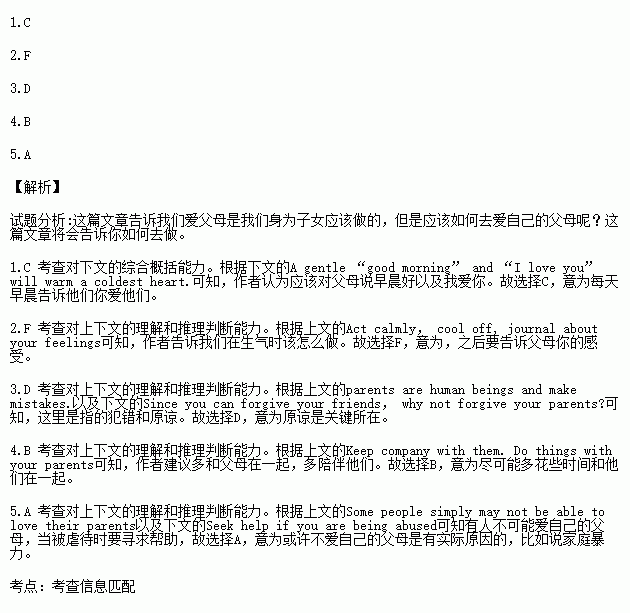题目内容
Even if you think that your parents are mean-spirited at times, loving your parents is a normal and fulfilling part of life. You love them for the fact that they created you,raised you,and are in part a source of who you are. Here are some ways to love your parents.
____1._ A gentle “good morning” and “I love you” will warm a coldest heart. Remember that they brought you into this world. Without your parents,you might still wander at an unknown corner in an unknown world.
Respect them more and cherish these moments. You can use these moments to learn from them for when you’re off on your own. It’s OK to get angry but angry actions don’t help you or your parents. Act calmly, cool off, journal about your feelings,or talk to a friend. ___2.____
Obey their requests. It will make your attitude better and earn you more respect from them. It may seem like you are going through hell when you don’t get what you want or you have to clean. However,you had better remember they keep a roof over your head when it’s cold, raining,snowing,or too hot. Understand that parents are human beings and make mistakes.____ 3.___. Since you can forgive your friends, why not forgive your parents?
Keep company with them. Do things with your parents like watching TV,or go somewhere with them._ 4._ Listen to their old stories and learn from them. You will find they are your teachers in this way or another.
Some people simply may not be able to love their parents. __5.___ Seek help if you are being abused in any way. Parents do not have a right to harm you.
A. There can be realistic reasons for this,family violence for example.
B. Anyway,spend as much time with them as you can.
C. Tell them you love them every morning.
D. Forgiveness is the key.
E. Parents will in turn express their love to you.
F. After this, share your feelings with your parents.
G. Please remember parents are as important as friends.

